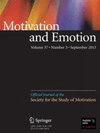For the love of my child: How parents’ relative extrinsic aspirations for children and interdependent self-construal predict their relational well-being
IF 2.5
3区 心理学
Q3 PSYCHOLOGY, EXPERIMENTAL
引用次数: 0
Abstract
Abstract Self-determination theory suggests that holding extrinsic aspirations (e.g., getting rich) over and above other aspirations bears negative implications for one’s relational well-being. The present research examined whether this pattern generalizes to the aspirations people hold for significant others and more specifically whether parents’ extrinsic aspirations for children (AFC), relative to other AFC, predict their well-being in their relationships with children. We also examined whether this relationship varies depending on parents’ interdependent self-construal. Results of four correlational studies ( N = 998 parents) revealed that, overall, relative extrinsic AFC predicted lower relational well-being. However, this relationship was attenuated among parents high (vs. low) in interdependent self-construal. This pattern of moderation was observed among U.S. parents at different stages of parenthood and partially replicated among a sample of Chinese parents. The findings suggest that interdependent self-construal could buffer against the negative implications of prioritizing extrinsic AFC for parental well-being.为了爱我的孩子:父母对孩子的相对外在渴望和相互依赖的自我解释如何预测他们的关系幸福
摘要自我决定理论认为,将外在愿望(如致富)置于其他愿望之上,会对一个人的人际关系健康产生负面影响。本研究考察了这种模式是否适用于人们对重要他人的期望,更具体地说,父母对孩子的外在期望(AFC),相对于其他AFC,是否能预测他们与孩子关系中的幸福感。我们还研究了这种关系是否会因父母相互依赖的自我解释而变化。四项相关研究(N = 998名家长)的结果显示,总体而言,相对外在AFC预测较低的关系幸福感。然而,这种关系在父母相互依存的自我建构高(相对于低)的情况下减弱。这种适度的模式在不同阶段的美国父母中被观察到,在中国父母的样本中也有部分重复。研究结果表明,相互依赖的自我解释可以缓冲优先考虑外在AFC对父母幸福的负面影响。
本文章由计算机程序翻译,如有差异,请以英文原文为准。
求助全文
约1分钟内获得全文
求助全文
来源期刊

Motivation and Emotion
Multiple-
CiteScore
5.40
自引率
4.20%
发文量
69
期刊介绍:
Motivation and Emotion publishes articles on human motivational and emotional phenomena that make theoretical advances by linking empirical findings to underlying processes. Submissions should focus on key problems in motivation and emotion, and, if using non-human participants, should contribute to theories concerning human behavior. Articles should be explanatory rather than merely descriptive, providing the data necessary to understand the origins of motivation and emotion, to explicate why, how, and under what conditions motivational and emotional states change, and to document that these processes are important to human functioning.A range of methodological approaches are welcome, with methodological rigor as the key criterion. Manuscripts that rely exclusively on self-report data are appropriate, but published articles tend to be those that rely on objective measures (e.g., behavioral observations, psychophysiological responses, reaction times, brain activity, and performance or achievement indicators) either singly or combination with self-report data.The journal generally does not publish scale development and validation articles. However, it is open to articles that focus on the post-validation contribution that a new measure can make. Scale development and validation work therefore may be submitted if it is used as a necessary prerequisite to follow-up studies that demonstrate the importance of the new scale in making a theoretical advance.
 求助内容:
求助内容: 应助结果提醒方式:
应助结果提醒方式:


